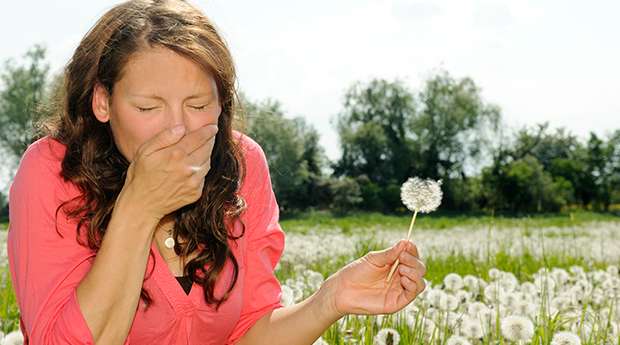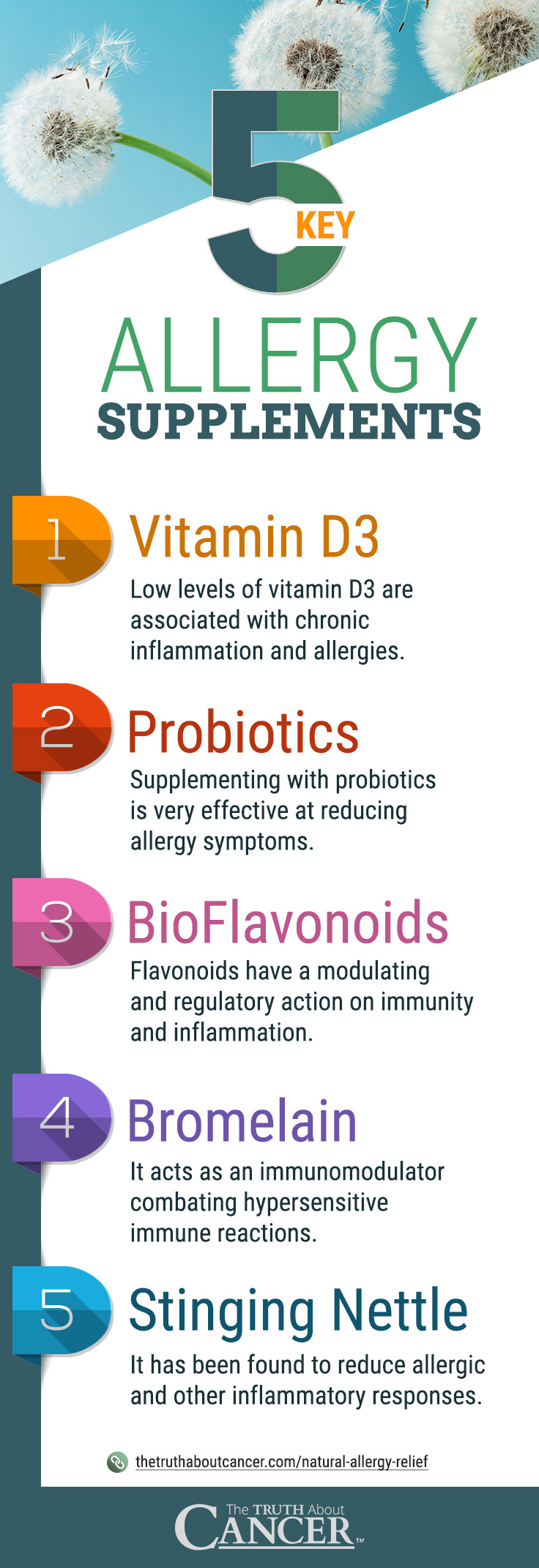Seasonal allergies, also called hay fever or allergic rhinitis, cause symptoms that manifest during specific times of the year. Symptoms of seasonal allergies are itchy, watery eyes, runny nose, hives, sneezing, and others. Seasonal allergies develop when the body’s immune system becomes sensitized and overreacts to something in the environment. The type of seasonal allergy a person develops depends on what is causing the immune reaction. In this article you’ll discover what causes seasonal allergies and some natural allergy relief solutions.
What Causes Seasonal Allergies?
Pollen is a fine powder released from flowering plants. Pollen is a plant’s only form of reproduction and it is produced in mass quantities. Pollens spread by the wind or are carried by insects.
When pollen is in the air, it can settle in a person’s eyes, nose, lungs, and skin and cause an allergic reaction. An allergic reaction occurs because the person’s immune system treats the pollen as an invader and responds by producing large amounts of antibodies. This allergic reaction can cause numerous unpleasant symptoms.
Pollen can travel long distances. Levels of pollen in the air can vary from day to day and even hour to hour. There are different pollens for each pollen season. There are even some plants that pollinate year-round.
Which Season Are Your Allergies Most Active?
Grass, tree pollen, weeds, and mold are the most common triggers of seasonal allergies. In many areas of the United States, tree pollination occurs between February and May. Grass pollination occurs from May to June, and weeds are from August to October. Mold spores usually increase between mid-summer through the fall. If your symptoms of seasonal allergies are stronger during one of these specific time periods, it is an indication that your immune system is reacting to that particle.
Here are the primary allergens that cause allergy symptoms to flair each season:
-
Spring Allergies
If you suffer from allergic symptoms in the spring, the symptoms are probably caused by tree pollens. Trees start pollinating anytime from January to April, depending on the climate and location. Trees that are known to cause severe allergies include oak, pine, olive, elm, birch, ash, hickory, poplar, sycamore, maple, cypress, and walnut. In certain areas of the world, some weeds will pollinate in the spring.
-
Summer Allergies
Grass pollen is typically the main culprit for late spring and early summer allergies. While grass pollen is highest at these times, grass may cause allergies throughout much of the year. For people with grass pollen allergies, any contact with grass can result in symptoms such as itching and hives.
Grasses can be divided into two major classes based on the area of the country: northern and southern. Northern grasses, which are common in colder climates, include timothy, rye, orchard, sweet vernal, red top, and blue grasses. Southern grasses are present in warmer climates. Bermuda is the most common southern grass.
-
Fall Allergies
The most common cause for fall allergies is ragweed. Ragweed is a plant that grows wild over most of the United States, especially the East Coast and Midwest. Other plants that trigger fall allergies include sagebrush, pigweed, tumbleweed (Russian thistle), burning bush, and cocklebur. In certain areas of the world, some trees can pollinate in the fall as well.
Other common allergens include indoor molds, dust mites, pet dander, and cockroaches. Allergic reactions to these allergens can occur all year long (perennial allergies). It is important to identify which of these are your major allergens so you minimize your exposure to them.
3 Immune System Issues That Can Lead to Seasonal Allergies
Allergies are one of the most common chronic health conditions in the world. Allergic reactions begin in the immune system when a common substance, like dust mold or pollen, is encountered by a person who is allergic to that substance.
The immune system will overreact by producing antibodies that attack that allergen. These antibodies travel to cells that release chemicals liked histamine and leukotrienes. These chemicals inflame the lining of your nasal passages, sinuses, and eyelids and cause sneezing, itching, runny nose, watery eyes, and other seasonal allergy symptoms.
Certain environmental influences can cause a person to not develop a normal immune response. The person is then prone to allergies throughout his or her life. Others encounter some sort of an immune insult during their life that throws their immune system out of control.
Here are 3 common issues which affect the immune system and may result in allergies:
#1. Gut Microflora
One of the most common conditions that affects the immune system is altered gut microflora. At least 70% of the body’s immune cells are in the gut. The gut microflora are largely responsible our immune response. When gut microflora are balanced and the immune system is working as it should, the body is able to distinguish between safe environmental particles (pollen, dust, weeds) and unsafe environmental particles (bad bacteria, bad yeast, and viruses).
When the gut microflora are imbalanced, the immune system can be oversensitive to safe environmental particles. This may lead to seasonal allergies and other conditions such as autoimmune and chronic inflammatory conditions.
#2. Early Life Factors
Several early life factors can result in a child having imbalanced gut microflora. These include the mother’s microflora at birth, caesarian delivery, genetically modified foods in the mom’s and baby’s diet, formula feeding, vaccinations, physical trauma to the child, and antibiotic usage.
Antibiotics are one of the leading causes of imbalanced gut microflora. Antibiotics are found in food as well as given for medical reasons. It is critical to avoid commercial meats and dairy because most commercial farms give antibiotics to their animals. These antibiotics throw off our microflora balance and disturb the immune system.
It is also important for both mom and child to avoid genetically modified foods. Genetically modified foods are high in environmental chemicals and alter the microflora balance. The use of processed infant formulas, rather than breast milk, can also contribute to the development of altered and unhealthy microbiome in a child.
#3. Vaccinations
Vaccinated children are much more vulnerable to allergies. A 2010 study found a link between vaccinations and allergies. In the study, 40% of vaccinated children reported at least one allergy. Only 10% of children who were not vaccinated reported an allergy. The same study showed that almost 11% of vaccinated children have seasonal allergies, whereas only 2.5% of non-vaccinated children have this condition.
Vaccines act to strengthen the adapted or acquired part of our immune system led by antibody formation. Within this system there are two branches, Th1 and Th2. Vaccines are believed to overstimulate the Th2 branch of the adapted immune system. This creates an immune imbalance that leads to hyper-inflammatory conditions. These hyper-inflammatory conditions can lead to allergies in certain individuals.
2 Key Strategies for Helping to Ensure Kids Don’t Develop Allergies
#1. Supplementing With Vitamin D, Probiotics, and Omega 3s
A family can take numerous steps to ensure that children will not develop allergies. It starts while Mom is pregnant. She should optimize her vitamin D3 levels to 60-100 ng/ml. This will likely require supplementation of 5,000-10,000 IU daily along with a small amount of vitamin K2.
During pregnancy Mom should boost her gut microbiome by eating raw fruits and vegetables and fermented foods. She should also take probiotic supplements. This will help nourish Mom’s microbiome and provide the proper immune control for a healthy child.
Mom should also balance her omega-6 to omega-3 fatty acid ratios by eating grass-fed meats and wild-caught fish. She can also take purified fish oil supplements. Mom should completely avoid processed foods and foods cooked with inferior vegetable oils such as canola and corn oils.
#2. Breast Feeding
To optimize a newborn baby’s gut flora and immune system, the baby should be exclusively breastfed. The first six months are the critical time for breastfeeding. The ideal length of time to breastfeed is the first 12 to 18 months.
Human breast milk is anti-inflammatory. It provides valuable immunoglobulins early in life that play an enormous role in supporting the infant’s immune system as it matures.
Mother’s milk is a rich source of medium-chain saturated fats such as lauric acid. These healthy fats help feed and strengthen the baby’s immune cells. Mother’s milk also provides IgA and probiotics which inoculate the baby’s gut and give it a defense against dangerous intestinal microbes. Without this defense, these microbes can damage the baby’s gut lining.
Natural Allergy Relief: Using Nutrition & Supplements in the Battle Against Seasonal Allergies
An anti-inflammatory diet and lifestyle are important in overcoming allergies. The first step is rebuilding the intestinal wall with probiotics and fermented foods. Avoiding inflammatory foods and consuming whole foods rich in omega 3 fatty acids and antioxidants will help reduce inflammation.
The most common inflammatory foods that should be avoided include gluten, dairy, peanuts, soy, corn, sugar, and vegetable oils (corn, soy, cottonseed, canola, peanut). The diet should be rich in chlorophyll-rich veggies and bioflavonoid-rich fruits and veggies such as onions, lemons, limes, grapefruit, berries, and herbs of all kinds.
Immune-enhancing fats such as coconut oil, grass-fed butter or ghee, olives and olive oil, and avocados should be included. Animal products such as grass-fed beef and lamb, organic poultry, and wild-caught fish should be consumed regularly on this allergy-fighting plan.
5 Key Supplements for Natural Allergy Relief
#1. Vitamin D3: The immune system needs vitamin D3 to function properly. Low levels of vitamin D3 are associated with chronic inflammation and allergies. In order to get adequate amounts of vitamin D, high quality sun exposure on a regular basis or supplementing with 1,000 IU of vitamin D3 with 4.5 mcg of K2 per 25 pounds of body weight daily is recommended.
#2. Probiotics: Quality probiotics offer a beneficial defense against allergies caused by unwarranted inflammation. They also keep the gut healthy to ensure the immune system functions well. Studies have shown that supplementing with probiotics is very effective at reducing allergy symptoms.
#3. Quercetin & BioFlavonoids: Quercetin, dihydroquercetin (DHQ) and rutin are active bioflavonoids. Flavonoids have a modulating and regulatory action on immunity and inflammation. They also work synergistically with other antioxidants to protect tissues from the negative effects of oxidation and inflammation often observed during hyperimmune reactions.
#4. Bromelain: Bromelain is an enzyme complex extracted from the stem and fruit of the pineapple. It acts as an immunomodulator combating hypersensitive immune reactions. Studies identified its positive effects on controlling edema, tissue permeability, and vasodilation. Bromelain also enhances the absorption of quercetin.
#5. Stinging Nettle: Stinging nettle leaf has been found to reduce allergic and other inflammatory responses. Extracts from leaves of stinging nettle are used as anti-inflammatory remedies.
Chiropractic Care Can Help With Allergies
The spine is susceptible to numerous traumas, including birth, regular physical activities, as well as accidental injury from car accidents and falls. These traumas lead to upper cervical (neck) subluxation that puts pressure on the brain. Depending on the type of injury and which nerve pathways of the spine become disrupted, spinal subluxations can increase the risk for weakened immunity and allergic reactions.
Chiropractic care can remove upper cervical subluxations and restore proper structural and neurological function to the spine and nervous system. Chiropractic care includes specific chiropractic adjustments which release pressure on the brain stem and certain exercises to maintain this correction and improve posture. Seeking the aid of a chiropractor is highly beneficial when suffering from seasonal allergies.
8 Practical Lifestyle Tips to Reduce Symptoms of Seasonal Allergies
If you’re looking for natural allergy relief that doesn’t rely on pharmaceuticals, it is important to devise strategies to minimize your exposure to pollen. These strategies include:
- Monitor pollen and mold counts. Weather reports often include this information.
- Limit outside exposure from 5 am to 10 am when pollen counts are highest. Pollen counts are also very high around dusk.
- Keep windows and doors shut at home and in your car during allergy season.
- Take a shower and wash your hair after working or playing outdoors.
- Change and wash clothes that have been exposed to pollen.
- Remember your pets are exposed to pollen when outside.
- Do not line dry clothes outside when pollen counts are high.
- Wear sunglasses and a N95 filter mask when mowing the lawn or doing outdoor chores.
Article Summary
An allergic reaction occurs because the person’s immune system treats the pollen as an invader and responds by producing large amounts of antibodies.
Spring allergies: trees that are known to cause severe allergies include oak, pine, olive, elm, birch, ash, hickory, poplar, sycamore, maple, cypress, and walnut.
Summer allergies: while grass pollen is highest at these times, grass may cause allergies throughout much of the year.
Fall allergies: the most common cause of fall allergies is ragweed, sagebrush, pigweed, tumbleweed (Russian thistle), burning bush, and cocklebur.
3 common issues which affect the immune system and may result in allergies:
- Gut microflora imbalance
- Early life factors
- Vaccinations
5 key supplements for natural allergy relief:
- Vitamin D3
- Probiotics
- Quercetin & BioFlavonoids
- Bromelain
- Stinging Nettle
8 practical lifestyle tips to reduce symptoms of seasonal allergies:
- Monitor pollen and mold counts. Weather reports often include this information.
- Limit outside exposure from 5 am to 10 am when pollen counts are highest. Pollen counts are also very high around dusk.
- Keep windows and doors shut at home and in your car during allergy season.
- Take a shower and wash your hair after working or playing outdoors.
- Change and wash clothes that have been exposed to pollen.
- Remember your pets are exposed to pollen when outside.
- Do not line dry clothes outside when pollen counts are high.
- Wear sunglasses and a N95 filter mask when mowing the lawn or doing outdoor chores.




















Thank you for any other informative site. Where else
may I am getting that kind of info written in such an ideal method?
I’ve a undertaking that I am simply now operating on, and I’ve been on the
glance out for such info.
I never knew that an allergic reaction occurs because the person’s immune system treats the pollen as an invader and responds by producing large amounts of antibodies. I have a very bad allergy to peanuts. Thanks for the tips on natural allergy relief.
I like that you pointed out that there are allergies that come only at specific times of the year like in summer or in spring and often show signs of itchiness or watery eyes. When summer comes, we often hear our sister complains of hives or sneezing for reasons she cannot tell exactly. As you mentioned there were seasonal allergies, your article does help identify what’s happening to my sister on summer days could be due to that. Once I see her again, I will tell her about your article and advise to seek treatment for that allergy to help her handle that.
Why these antibodies are produced at some people and at some other don’t get produced?and they don’t get alergic.
Hi!, Which foods do you recommend for getting Quercetin & BioFlavonoids? are multivitamins effective to treat allergies?
Thanks.
I think that I am allergic to the mosquito repellant because whenever I put it in my skin, I start sneezing.